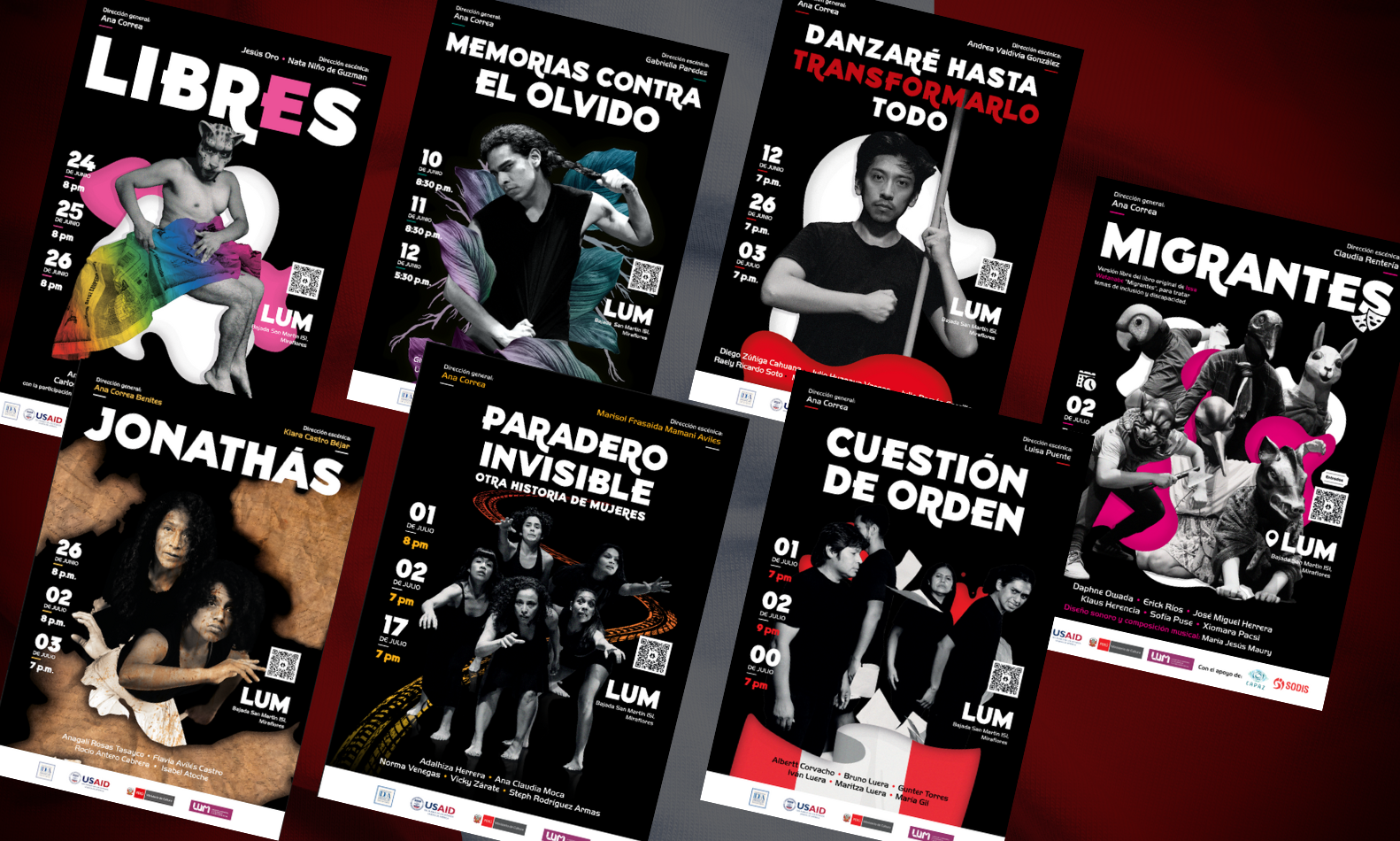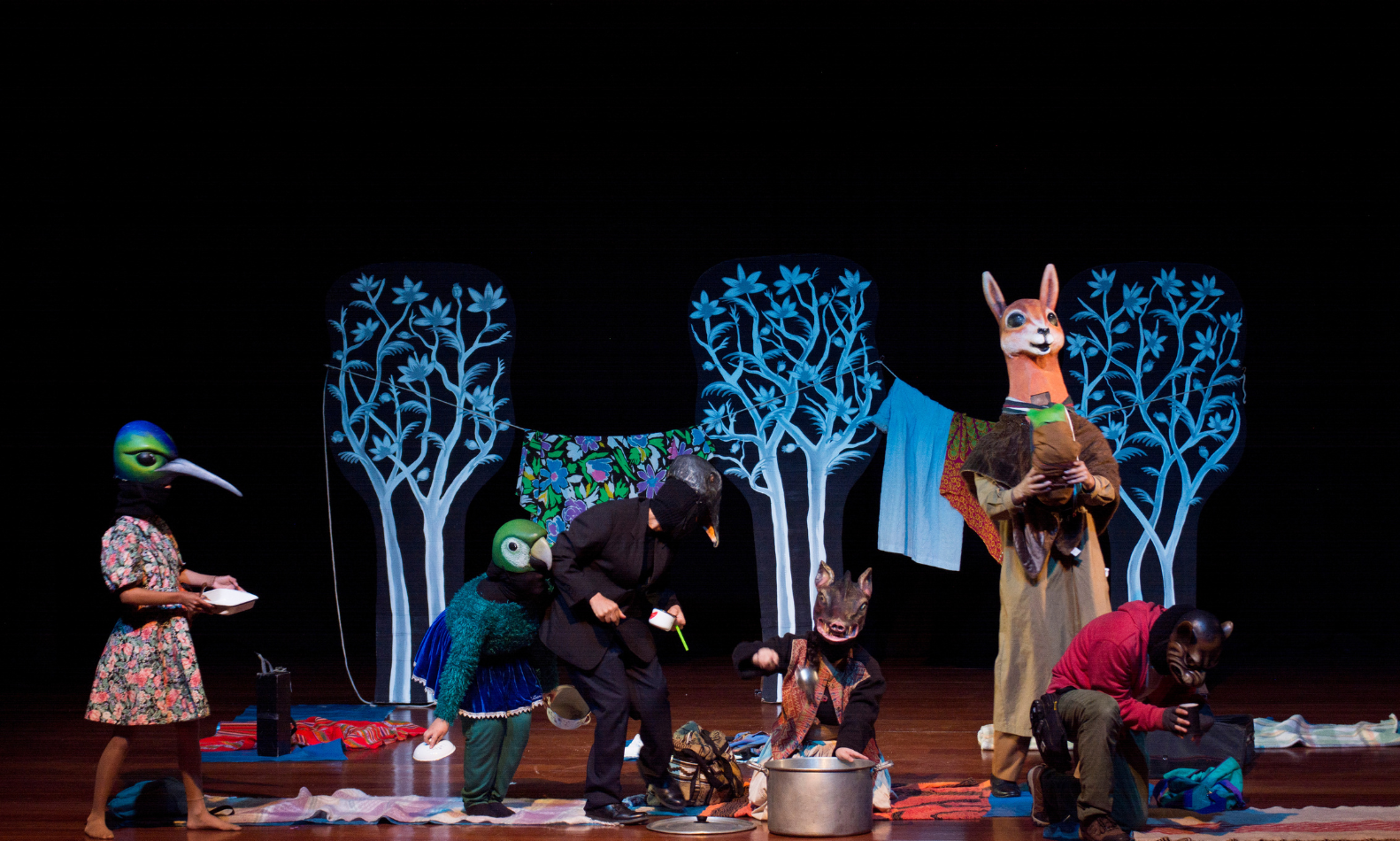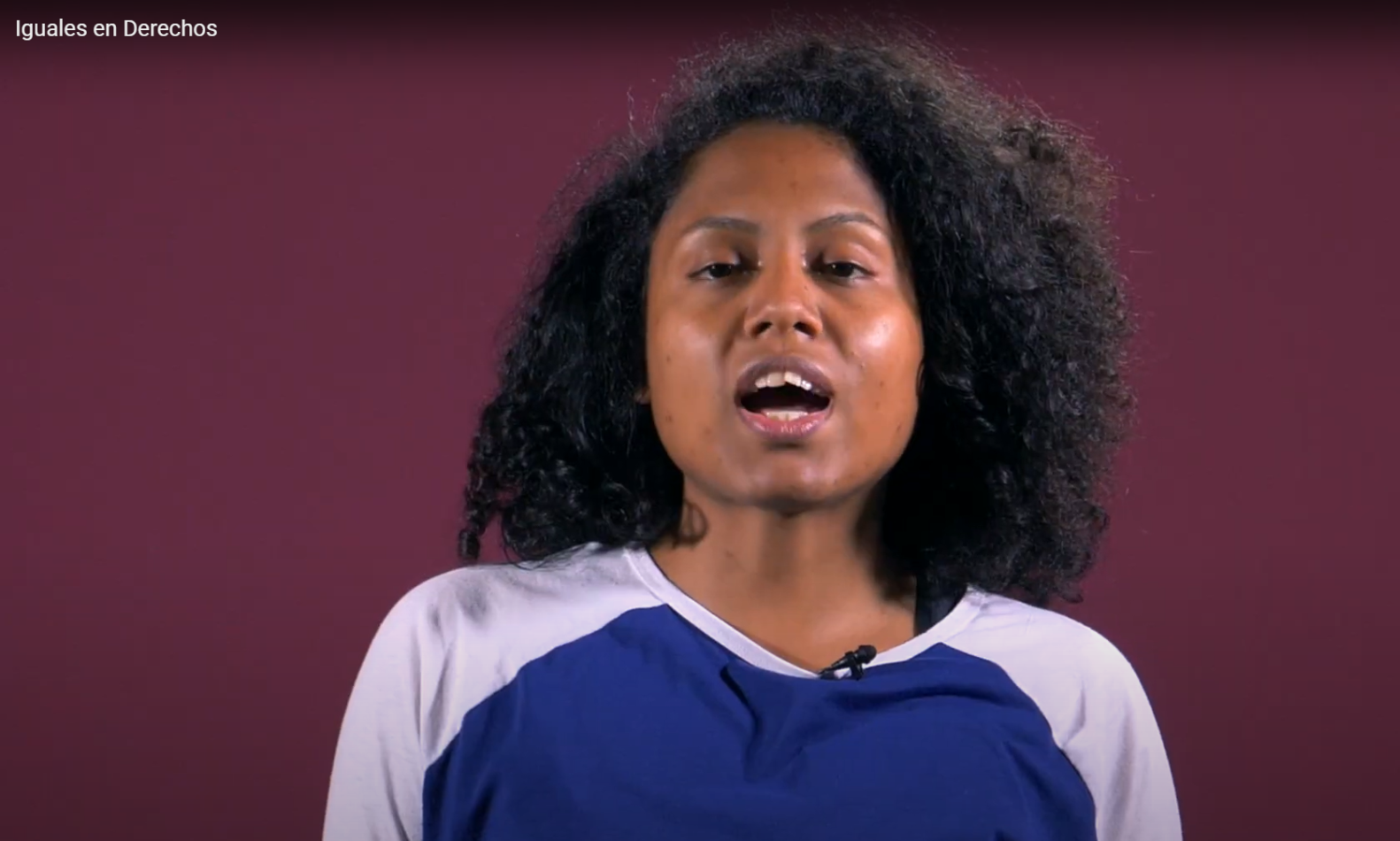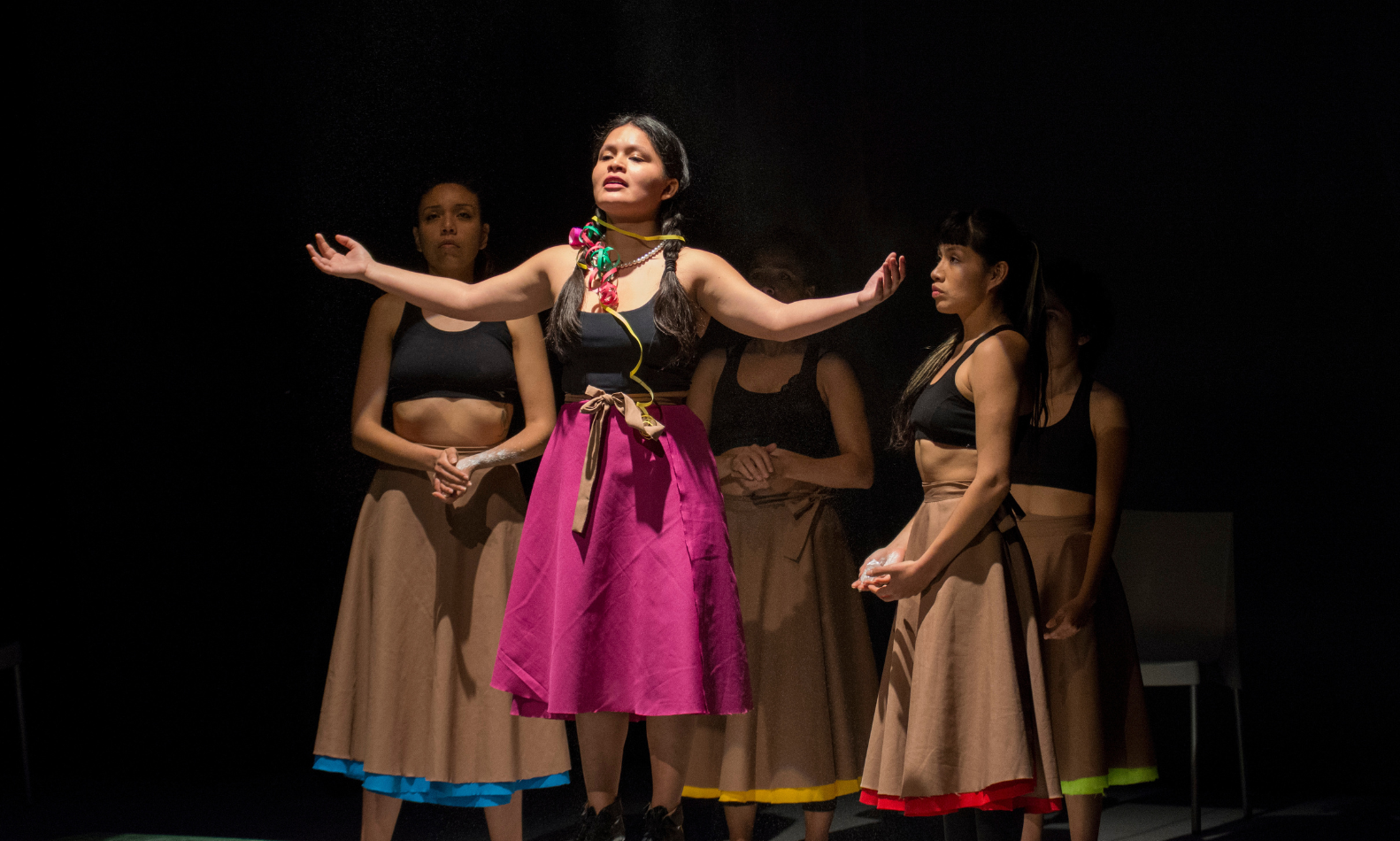In the context of the preparations for the regional and municipal elections in 2022 in Peru, a cycle of seven plays was organised under the title "To meet each other: Dialogues and Otherness", a production of International IDEA, USAID and the Place of Memory, Tolerance and Social Inclusion (LUM, in Spanish).
The objective of these works was to make visible the problems faced by historically excluded populations in Peru, as well as to expose their needs so that they are taken into account in the electoral agenda.
All the plays had the general direction of stage teacher Ana Correa. They were created through a process of dialogue between the artists and representatives of civil society to provide them with a look at the situation of traditionally vulnerable populations and their main demands for the electoral campaign that took place in October 2022. These organisations include the NGO SODIS - Society and Disability, the Peruvian Network of Afro-descendant Youth - Ashanti Peru and Más Igualdad.
The works display various scenic languages so that audiences understand the priorities and needs of people with disabilities, the Afro-Peruvian people, indigenous or native peoples, the LGTBIQ+ community, women and youth to move towards a more stable and inclusive democracy.
REPERCUSSION
Until November 2022, mora than 2,500 people have seen the performances in the different spaces.
Results of the high involvement of the actors and actresses
The artivists have collaborated in disseminating the works due to their commitment to their content, even after the initial diffusion period. Given these initiatives, International IDEA continued to collaborate with them, providing elements for the production of the pieces. In this way, it has been possible to continue disseminating Point of Order and Invisible Whereabouts: Another Story of Women and Migrants.
Artists presented more sessions than expected
There were 19 performances in the cycle prepared by International IDEA at LUM. However, thanks to the dissemination work of the artivists, four performances of Point of Order have been added (at the Haciendo Pueblo Cultural Center in Comas, at an event for young candidates and at the Grand National Theater), four performances of Invisible Whereabouts: Another Story of Women (in four British theatres in the city of Lima) and one more performance of Migrants (in a festival of plays aimed at people with disabilities, in Lima, also organized by the British Council in Lima).
The play Point of Order was presented to political candidates from various communities
Thanks to Ashanti Peru, Point of Order , the play with the most significant electoral content, has been presented to young candidates during the last regional and municipal elections. Ashanti Peru is an ally of International IDEA that works in the political formation of young Afro-Peruvians.
A presentation was performed before the candidates of the Comas district, on the premises of the Haciendo Pueblo Cultural Center. The event facilitated the signature of a pact to favour culture and democracy.
Finally, it had two performances during the pre-election week at the Gran Teatro Nacional, the most important stage in the country. International IDEA, took the opportunity to share information about the electoral content and applications that we have worked on with our allies in the media.
Presentations continue in 2023
Until March 2023, the play Invisible Whereabouts: Another Story of Women will be presented to the city of Trujillo, Point of Order to Arequipa, Migrants to Cusco and Memories against Oblivion to Iquitos. Plays will tour to perform at least three presentations in each city, aimed to sensibilize civil society organizations representing vulnerable populations with whom we are working on the Voces Ciudadanas project, and also at local artivists. Likewise, we are adding to the tours a workshop on socio-emotional skills from the performing arts for young activists and members of political parties.
ABOUT THE SEVEN PLAYS
In this peculiar ceremony to celebrate the deceased grandmother's birthday, two young women discover, through some letters inherited, that they are descendants of Jonathás and Nathán, the Afro-descendant sisters of the female liberator Manuela Sáenz.
By removing the umbilical cord, both women change time and space, rekindling the freedom struggle of their ancestors. Join these young women in the celebration and the reunion with their origins. A revealing trip that will fill them with pride to continue writing their story.
Topic: Afro-Peruvian people. // Duration: 45 min. // Scenic direction: Kiara Castro
A group of diverse animals meet to traverse a night forest devoid of leaves. Next to the group, a little colourful Death travels, reminding them at every step of the value of life. Together they move forward, leaving loneliness behind to build a community where they can be themselves, embracing their differences and longings. Despite the fact that the road is long and the risks are many, hope flourishes.
Based on the original book by Issa Watanabe, Migrantes, it is a family-friendly montage that proposes a universe of animals with and without functional diversity that bond in times of crisis.
The work has resources for blind people, such as audio descriptions and a space recognition tour.
Topic: Disability and migration // Duration: 45 min. // Scenic direction: Claudia Rentería
In an attempt to return to "normality", a group of young people rehearse the Aymara warrior dance "tinku" for a contest. As a result of the pandemic and the political crisis, they have lost their jobs and abandoned their studies, and some are going through emotional crises. That is why dance gives them strength, and they seek encouragement. They remembered their steps in the streets of downtown Lima in November 2020. They are raising flags and posters, deactivating tear gas bombs, cleaning wounds and recording everything. They regain the strength to continue dancing in the streets and in their lives.
Topic: Youth people // Duration: 45 min. // Scenic direction: Andrea Valdivia González
A group of young people attend a call to conduct research from the arts on issues they face as part of the LGTBIQ+ population. In this space, they share their personal testimonies in dialogue with memory and trauma, as well as the desire to achieve, through art, symbolic reparations. By sharing, they discover parallel realities with which they identify and decide to be part of a collective action that makes visible their right to live fully happy.
Topic: LGTBIQ+ // Duration: 45 min. // Scenic direction: Jesús Oro y Nata Niño de Guzmán
The play tells the internal journey of a woman who finds herself in the dilemma of who she is and how to cling to herself. So, she decides to embark on a tour taking her bicycle to different parts of the country, seeking inspiration and finding an answer in the lives of Peruvian heroines: María Rostorowski, María Parado de Bellido, Manuela Saenz, Micaela Bastidas and Maria Elena Moyano.
This dreamlike work recreates her inner world, where we will find her different voices through five actresses on stage, who will narrate the journey of her emotional search through fire and the image of the sun. Throughout the trip, they will share and unite her experiences, helping this unique woman find herself and strengthen herself.
A free version of the documentary by Karen Bernedo, Where are the women?
Topic: Gender and women // Duration: 45 min. // Scenic direction: Marisol Mamani Avilés
The play tells the internal journey of a woman who finds herself in the dilemma of who she is and how to cling to herself. So, she decides to embark on a tour taking her bicycle to different parts of the country, seeking inspiration and finding an answer in the lives of Peruvian heroines: María Rostorowski, María Parado de Bellido, Manuela Saenz, Micaela Bastidas and Maria Elena Moyano.
Based on the myth of the indigenous rebellion led by Juan Santos Atahualpa, various historical moments are presented through the presence of six students from different eras, who will begin a sensory journey of identities and memories through the indigenous territories of our country.
The work presents us with a visual and geographical dramaturgy in which the words and actions of the group of students are intertwined with video-archives and sound textures. In a kind of limbo between reality and fiction, we witness scenes from the student rebellion in Huanta in 1969, the precariousness of educational conditions in the pandemic, and the struggles of our indigenous or native peoples against the contamination of their lands.
Based on the narratives we witness, we rescue from the knowledge of our indigenous peoples the need to live in harmony between species, taking care of each other, cultures and our environments. Thus, issues are raised that should be present on the political agenda of our country: the recognition of the identities of our peoples, their contributions to the development of our republic and democracy, the right to education and the defence of the territory.
Topic: Indigenous or native peoples// Duration: 45 min. // Scenic direction: Gabriella Paredes
District development projects are discussed at a neighbourhood council meeting. The board members propose projects that seek to address and make visible the problems they have faced during the pandemic and confinement, including violence against women, homophobia, unemployment, cracked mental health and exclusion of people with disabilities. The neighbours discuss their proposals, looking at each other, questioning and accepting each other to seek an integrating recommendation.
Topic: Mixta // Duration: 45 min. // Stage Coordination: Luisa Puente Altamirano
PARTNERS
This initiative of the International IDEA office in Peru has been carried out with the sponsorship of USAID and the support of The Place of Memory, Tolerance and Social Inclusion (LUM), of the Ministry of Culture of Peru, the Peruvian Network of Afro-descendant Youth (Ashanti Perú), Más Igualdad Perú, Society and Disability (SODIS) y Capaz Perú.
For more project details, please get in touch with Percy Medina, Head of Mission of International IDEA in Peru and Maritza Colmenares, Communication officer.
TESTIMONIALS FROM THE STAGE DIRECTORS AND THE CRITICS
“I am very grateful for this opportunity that International IDEA has managed together with other organizations, because it is very important. It is very important that art spaces be generated in which high-quality conditions have been created to be able to create, create freely and create about problems that matter to our nation.”
Andrea Valdivia, Scenic Director, I will dance until I transform everything
“We have had a good reception. People have felt identified, they have felt their problems, they have felt part of the work, and we have received many emotions from the public. I thank International IDEA for the opportunity. And there will continue to be much more art to raise awareness, confront, accept, strengthen, and continue there, at the foot of the mountain and the fight for human rights.”
Luisa Puente, Scenic Director, Point of Order
“The work is direct, it does not become pamphleteering, but it is direct, it shows you in the raw what is happening with us in our day to day. And I think that the messages arrive in a very confrontational way, but also warm and tender towards the male public, with the male public, because I think we reveal many things that they see as normal, and they don't know that they cause us harm, and they are things daily routines.”
Marisol Mamani, Scenic Director, Invisible Whereabouts: Another Women's Story
“International IDEA planted the seed, and we have continued searching and want to continue with this. The cast is delighted and is interested in continuing to advocate for what they are, a group of privileged actors, because not many people with disabilities can have job opportunities, much less in art, because art is highly capable. We want to continue representing the issues that interest us and reaching more people.”
Claudia Carolina Rentería, Scenic Director, Migrants
“The theatre should always have a place reserved for memory. In this sense, Kiara Castro complies with the said condition. She shows us, in a stylized but forceful way, part of the ethnic-racial discrimination that this population has suffered (and continues to suffer), according to the disturbing statistics mentioned in the program. Jonathás is a valuable staging, which, like this entire cycle directed by Correa, seeks to generate much-needed dialogue and timely reflection in the viewer through theatrical shows.”
Sergio Velarde, critic ---> Read the review published at Oficio Crítico.
IMAGE GALLERY
Take a look at the images of the plays: IMAGE GALLERY










